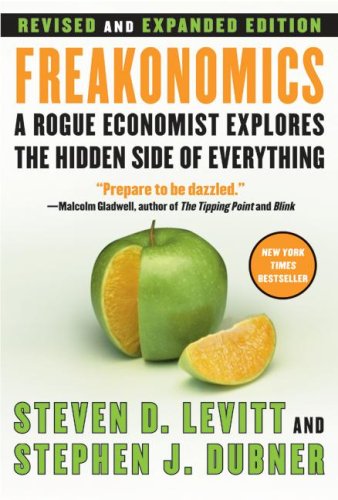All Nonfiction
- Bullying
- Books
- Academic
- Author Interviews
- Celebrity interviews
- College Articles
- College Essays
- Educator of the Year
- Heroes
- Interviews
- Memoir
- Personal Experience
- Sports
- Travel & Culture
All Opinions
- Bullying
- Current Events / Politics
- Discrimination
- Drugs / Alcohol / Smoking
- Entertainment / Celebrities
- Environment
- Love / Relationships
- Movies / Music / TV
- Pop Culture / Trends
- School / College
- Social Issues / Civics
- Spirituality / Religion
- Sports / Hobbies
All Hot Topics
- Bullying
- Community Service
- Environment
- Health
- Letters to the Editor
- Pride & Prejudice
- What Matters
- Back
Summer Guide
- Program Links
- Program Reviews
- Back
College Guide
- College Links
- College Reviews
- College Essays
- College Articles
- Back
Freakonomics: A Rogue Economist Explores the Hidden Side of Everything
Freakonomics basically explains that behind every little thing in the world, whether miniscule in impact or significant, economics is behind it. Freakonomics is truly groundbreaking, introducing mind-boggling questions that you would never have thought of. The questions may be unexpected, but the answers they supply are quite surprising, literally redefining the way we view the modern world.
Each chapter begins with a question. The further you read, the more data is explained to support Mr. Levitt and Mr. Dubner's reasoning. Use of polls, various unbiased statistics, facts from around the world, or pattern/trends. However, authors do caution after every chapter that correlation does not imply causation. The book was looking to disregard conventional wisdom and prove that the most unexpected things in the world can explain the economy today. 'With historical details, engaging work, full of insight and ideas, the 2 authors fulfill their purpose in 'showing that economics is the study of incentives.' (New York Times). Freakonomics is based on four primary concepts: that incentives are the key to modern life, conventional wisdom is often times wrong, dramatic effects often have distant causes, and that 'professionals' use their data to get higher in the societal ladder.
Levitt provides the reader with the thrill of learning new ideas and a captivating approach to investigating and drawing conclusions from statistics and past knowledge. Freakonomics is printed in a apparent, brief fashion using informal language but also some demanding vocabulary, which is why this book can be benefitted by high school student and adults. Levitt takes a conflict-ridden attitude in his analysis that would be most enjoyed by liberal people. One who is impartial would sense that this book has a new alertness of the world that may avoid 'conventional wisdom.'
Similar Articles
JOIN THE DISCUSSION
This article has 0 comments.

